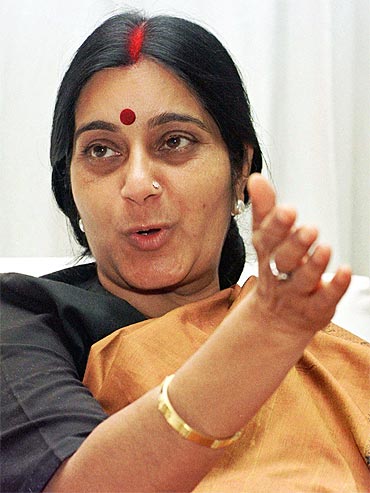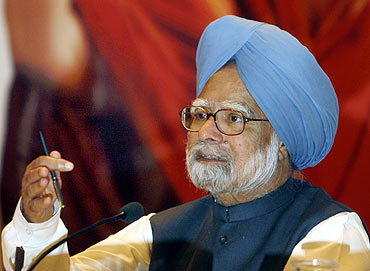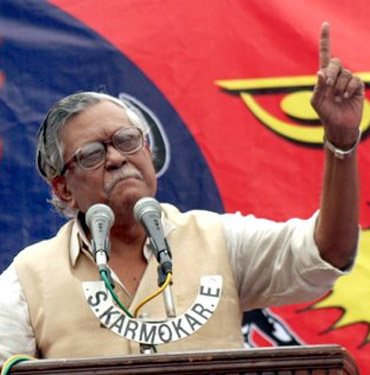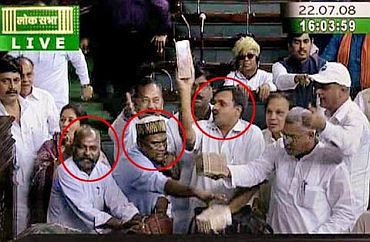This article was first published 14 years ago
Home »
News » WikiLeaks debate: 'It's PM's habit to blame others'
WikiLeaks debate: 'It's PM's habit to blame others'
Last updated on: March 23, 2011 15:41 IST
Image: Leader of the Opposition in the Lok Sabha Sushma Swaraj
A united Opposition on Wednesday mounted a scathing attack on Prime Minister Dr Manmohan Singh over the cash-for-votes scam, wondering as to how he could wash his hands of the matter as he had headed the government in 2008 and was the "biggest beneficiary" of the trust vote.
Leader of the Opposition in the Lok Sabha Sushma Swaraj made a stinging attack on Dr Singh in the Lok Sabha, telling him that as head of the government he should take responsibility instead of making others a scapegoat for the omissions and commissions of his regime.
"It is the habit of the prime minister to blame others. If it is price rise then Agriculture Minister Sharad Pawar is responsible, if it is 2G then A Raja is responsible and if it is Commonwealth Games then Suresh Kalmadi is to blame," she said.
...
Image: Prime Minister Dr Manmohan Singh
I don't know anything, I am not aware of anything, there are coalition compulsions and I am not that much guilty as I am made out to be' ...the people are fed up with such excuses. They are asking why are you the prime minister," she said, participating in a discussion in the Lok Sabha.
"The issue involves your leadership," she said, quoting an Urdu couplet which means one should not make any excuse but tell how the caravan got looted. The prime minister was present in the House and was listening intently to the debate.
Image: CPI leader Gurudas Dasgupta
Earlier, initiating the discussion on the PM's statement on the WikiLeak's expose in connection with the cash-for-votes scam, Communist Party of India leader Gurudas Dasgupta accused Singh of resorting to "parliamentary piracy" to win the vote of confidence in 2008 and demanded that he come clean.
He said the report of a parliamentary panel on the scam had clearly recommended "investigation by an appropriate agency" into the alleged attempts to purchase votes to win the trust vote on the Indo-US civil nuclear deal.
"It's a case of parliamentary piracy because some members were hijacked. The suspicion is that organised groups of political gangsters were at work," he said.
Dasgupta's remarks terming the alleged scam as an act of "parliamentary piracy" and the handiwork of "organised groups of political gangsters" drew an angry retort from the ruling benches.
Image: Video grab shows Opposition MPs waving currency notes in the Lok Sabha during the 2008 trust vote
As the CPI leader demanded a probe into large-scale absenteeism in the Opposition benches during the trust vote, ruling members, including Congress member Raj Babbar, were on their feet protesting the reference.
Taking objection to the prime minister's remarks that the United Progressive Alliance had returned to power even after the alleged scam, Dasgupta said, "Electoral verdict cannot condone criminality if it has been perpetrated."
He said the Congress had polled only 25 per cent votes in the general elections but did not want to draw any conclusion from it. "I make no conclusion. I do not say it is a minority government," he said. However, this contention by the prime minister gives credence to the 'might is right' theory.
"Might is right is a dangerous proposition that does not fit in in a democracy," he said.
Last week, the prime minister had hit out at the opposition for giving "dignity" to an "unverified communication", and pointed out that the Congress had won the 2009 Lok Sabha elections and that the tally of the Opposition parties had reduced considerably.
Dispatches by American diplomats, leaked by WikiLeaks and published in a national daily, purportedly claim that payoffs had been made to MPs to ensure a majority for the Congress-led government in the confidence vote following differences over the India-US nuclear deal in 2008.
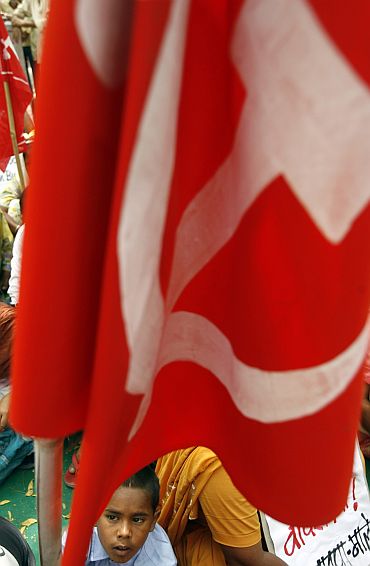
Photographs: Reuters
As per the cables, a US diplomat was told that Rs 50 to Rs 60 crore was kept aside by the Congress party to get some Opposition members of the Lok Sabha on board before the trust vote in July 2008 during the first tenure of the UPA government.
"I concede that the PM was precise in his statement and the statement was cogent. The PM was very prompt in throwing the ball in the court of the Opposition, his tone was very firm, normally he is not. He was firm in rejecting the complaints on cash-for-votes during the last no-confidence motion," said Dasgupta.
The CPI leader said linguistic fervour was used to conceal the facts. "Strong is the language of the weak and persuasive is the language of the strong," he said.
Source:
PTI© Copyright 2025 PTI. All rights reserved. Republication or redistribution of PTI content, including by framing or similar means, is expressly prohibited without the prior written consent.
